Part 155: Lesson 10: Deeper Into Jungian Psychology
-Specialist-



"Everyone Loves Jungian Psychology!" An invitation to the you that you don't know. The final lesson, our grand finale: "Deeper Into Jungian Psychology." Is this ever going to end? Eeeheehee...It's hard to say, isn't it? Now then, let's begin the lecture. Ventla, ventla, space cadets...


Personality types and dream interpretation...I've managed to introduce the main points of Jungian psychology to you. If you're a high school student, it might've been a bit hard for you...But you did well to come this far. Though I think we can ease off on the lectures, some of you might want to go even farther, get promoted, molt...For those people, I'll be glad to show you the next step. So, today we'll talk about the power that helped Jung formulate his superhuman-like theories. His interest in the mystical--what you would call the occult.


That was his fate. It was in his DNA. He was born in the Switzerland countryside to a "family that was close to spirits." To be more specific...His father was a pastor, and his mother was "from a bloodline that can sense spirits." I think it's safe to say that this environment helped him foster an interest in religion and the spiritual. In fact, he did experience something psychologically important. For instance, when he was three or four years old--quite young--he had a "dream" he was unable to forget. It was a terrifying dream: in a throne room past an underground tunnel, he saw a giant pillar of flesh known as the "man-eater." That dream may have been the starting point for his passion towards dream interpretation. On top of that, Jung took notice of "another personality" within himself at an early age. This other personality was an old, dignified man, who compensated for his feelings of inferiority as a boy. This sounds a lot like one of the archetypes he later proposed, the wise old man, doesn't it?


But, throughout his life, he had multiple experiences with poltergeist phenomena. Some cases include his family oak table splitting in two, and a steel bread knife shattering. Jung was also interested in the paranormal from a young age. He participated in a gathering to summon the spirits of the dead, held by a cousin who was a medium. It really shows how interested Jung was about the occult.


While Jung thought there was psychological meaning, Freud warned against getting too deep into the occult. One of the factors in the deterioration of their relationship was this difference in viewpoints regarding the occult. Well, they DID also disagree on some theories on psychoanalysis and had some personal incidents, but...Around the time Jung parted ways from Freud, he had a certain health problem. He himself became mentally ill.


Even as he suffered this illness, he drew upon his experience as a psychiatrist and turned it into a subject of study. So, what kind of visions did he see? Let me introduce one of them. There was a time when he saw visions of "Europe ending" with a giant flood. A few months later, the first World War broke out...His vision became a reality. It seems like a "prophetic dream," doesn't it? Jung interpreted this occurance as the result of the unconscious sensing the oncoming danger of the war. During this time, he also came across ghosts. According to him...After a group of ghosts burst into his house, he then spent three days writing an essay. In a sense, he acknowledged the existence of ghosts...But he saw those ghosts as "projections of his unconscious."
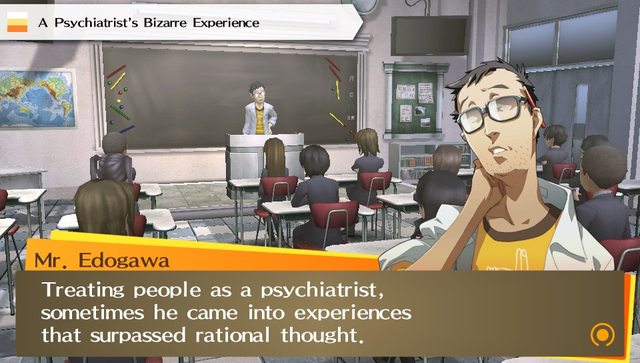

Jung was interested in things like that, as well. I'll relate a well-known anecdote about Jung as an example. This happened when he was talking with a female patient, interpreting her dreams. She was talking about a "golden scarab" in a dream, and at that moment, an actual beetle flew into the room. When this occurred, her mind was altered, and so was the treatment...Jung took notice of this mechanism of "coincidence." This "meaningful coincidence" leads to "synchronicity" and "constellation." Jung intertwined these with archetypes and theorized about the--well, we're skipping that. Maybe some other time.
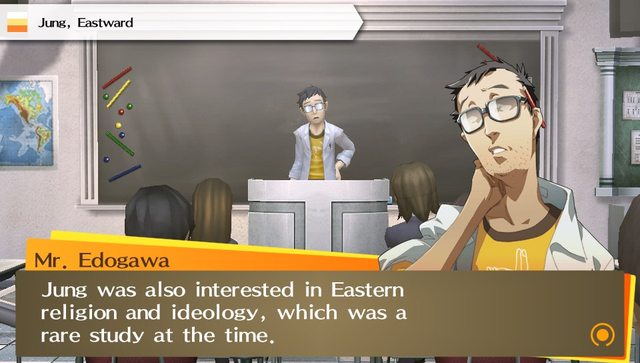

Hindu philosophy, zen ideology...Chinese fortune telling, alchemy...His inspirations came from everywhere. Take the mandala for example. That's a type of art in the Buddhist and Hindu religions, usually with many gods or buddhas drawn on them...He realized that there was a similarity between the structure of that art and the treatment he underwent during his illness. Jung knew from experience that you can see the state of the mind through "painting a circle." He found a common point between drawing a circle and mandalas. It seems he tried expanding his knowledge of relations that science couldn't explain by reading the I Ching, a Chinese system. Jung's ideas of "synchronicity" and "meaningful coincidences" were influenced by the I Ching.


"Alchemy" is a magical technology that people dreamed of long ago, famously to "turn lead into gold." Jung interpreted the principle of the process as a representation of "individuation." The influence of alchemy of Jung is obvious, as he has left several works on alchemy. He really took interest in the alchemic concept of the "union of opposites." Things of opposite properties eventually becoming one complete object...That idea became one of Jungian psychology's roots...Going this far in, you almost feel that all this talk of his occult study is rather mild...


He sure had a lot of energy...Not only did he take on ancient things like mythology, but he even integrated new mysteries into his studies. Modern mysteries such as UFOs.
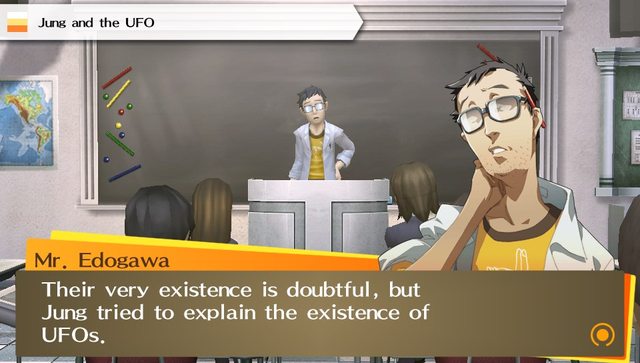

And his results were...Well, I'll make this short..."UFOs are icons of postmodern anxiety, coming from the collective unconscious." "UFOs are the modern day mandala"...to sum it up...Perhaps you'll be able to understand what that means, with the knowledge you've gained from these lessons. To illustrate how deeply Jung delved into the experiences of ancient technology and theology...
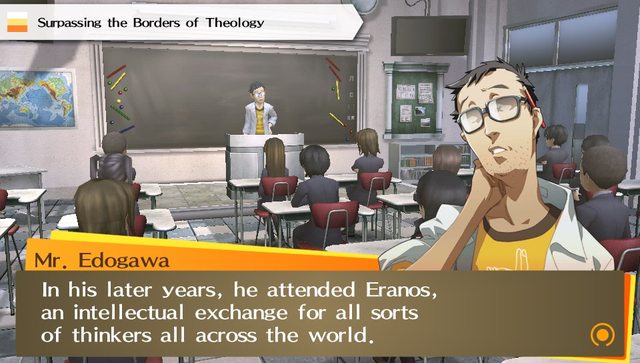

He directly and continually exchanged ideas and opinions with some of the best scholars in a number of fields. Jung associated with a variety of famed minds, even outside of Eranos. The author Hesse, the physicist Pauli and many big politicians were among his associates outside of his field. His achievements, influenced by a variety of people, have surpassed the borders of psychology and psychiatry. His work is not limited to psychiatrists; philosophers, authors and artists as well find inspiration in his works. He was one of the few psychologists that actually influenced the way people think.
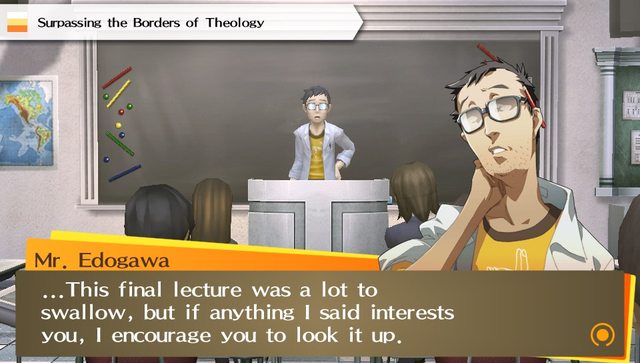

I'm sure something deep within your conscious will change or give you the opportunity to change. Oh...And, because these lessons are all my own personal opinions, I end on a disclaimer that no effects are guaranteed. Eeeheehee! Until we meet again. Nahtriheccunde Gahinneverahtunin Zehgessurklach Zunnus...


 "Everyone Loves Jungian Psychology!" An invitation to the you that you don't know. The final lesson, our grand finale: "Deeper Into Jungian Psychology." Is this ever going to end? Eeeheehee...It's hard to say, isn't it? Now then, let's begin the lecture. Ventla, ventla, space cadets...
"Everyone Loves Jungian Psychology!" An invitation to the you that you don't know. The final lesson, our grand finale: "Deeper Into Jungian Psychology." Is this ever going to end? Eeeheehee...It's hard to say, isn't it? Now then, let's begin the lecture. Ventla, ventla, space cadets...
 Personality types and dream interpretation...I've managed to introduce the main points of Jungian psychology to you. If you're a high school student, it might've been a bit hard for you...But you did well to come this far. Though I think we can ease off on the lectures, some of you might want to go even farther, get promoted, molt...For those people, I'll be glad to show you the next step. So, today we'll talk about the power that helped Jung formulate his superhuman-like theories. His interest in the mystical--what you would call the occult.
Personality types and dream interpretation...I've managed to introduce the main points of Jungian psychology to you. If you're a high school student, it might've been a bit hard for you...But you did well to come this far. Though I think we can ease off on the lectures, some of you might want to go even farther, get promoted, molt...For those people, I'll be glad to show you the next step. So, today we'll talk about the power that helped Jung formulate his superhuman-like theories. His interest in the mystical--what you would call the occult.
 That was his fate. It was in his DNA. He was born in the Switzerland countryside to a "family that was close to spirits." To be more specific...His father was a pastor, and his mother was "from a bloodline that can sense spirits." I think it's safe to say that this environment helped him foster an interest in religion and the spiritual. In fact, he did experience something psychologically important. For instance, when he was three or four years old--quite young--he had a "dream" he was unable to forget. It was a terrifying dream: in a throne room past an underground tunnel, he saw a giant pillar of flesh known as the "man-eater." That dream may have been the starting point for his passion towards dream interpretation. On top of that, Jung took notice of "another personality" within himself at an early age. This other personality was an old, dignified man, who compensated for his feelings of inferiority as a boy. This sounds a lot like one of the archetypes he later proposed, the wise old man, doesn't it?
That was his fate. It was in his DNA. He was born in the Switzerland countryside to a "family that was close to spirits." To be more specific...His father was a pastor, and his mother was "from a bloodline that can sense spirits." I think it's safe to say that this environment helped him foster an interest in religion and the spiritual. In fact, he did experience something psychologically important. For instance, when he was three or four years old--quite young--he had a "dream" he was unable to forget. It was a terrifying dream: in a throne room past an underground tunnel, he saw a giant pillar of flesh known as the "man-eater." That dream may have been the starting point for his passion towards dream interpretation. On top of that, Jung took notice of "another personality" within himself at an early age. This other personality was an old, dignified man, who compensated for his feelings of inferiority as a boy. This sounds a lot like one of the archetypes he later proposed, the wise old man, doesn't it?
 But, throughout his life, he had multiple experiences with poltergeist phenomena. Some cases include his family oak table splitting in two, and a steel bread knife shattering. Jung was also interested in the paranormal from a young age. He participated in a gathering to summon the spirits of the dead, held by a cousin who was a medium. It really shows how interested Jung was about the occult.
But, throughout his life, he had multiple experiences with poltergeist phenomena. Some cases include his family oak table splitting in two, and a steel bread knife shattering. Jung was also interested in the paranormal from a young age. He participated in a gathering to summon the spirits of the dead, held by a cousin who was a medium. It really shows how interested Jung was about the occult.
 While Jung thought there was psychological meaning, Freud warned against getting too deep into the occult. One of the factors in the deterioration of their relationship was this difference in viewpoints regarding the occult. Well, they DID also disagree on some theories on psychoanalysis and had some personal incidents, but...Around the time Jung parted ways from Freud, he had a certain health problem. He himself became mentally ill.
While Jung thought there was psychological meaning, Freud warned against getting too deep into the occult. One of the factors in the deterioration of their relationship was this difference in viewpoints regarding the occult. Well, they DID also disagree on some theories on psychoanalysis and had some personal incidents, but...Around the time Jung parted ways from Freud, he had a certain health problem. He himself became mentally ill.
 Even as he suffered this illness, he drew upon his experience as a psychiatrist and turned it into a subject of study. So, what kind of visions did he see? Let me introduce one of them. There was a time when he saw visions of "Europe ending" with a giant flood. A few months later, the first World War broke out...His vision became a reality. It seems like a "prophetic dream," doesn't it? Jung interpreted this occurance as the result of the unconscious sensing the oncoming danger of the war. During this time, he also came across ghosts. According to him...After a group of ghosts burst into his house, he then spent three days writing an essay. In a sense, he acknowledged the existence of ghosts...But he saw those ghosts as "projections of his unconscious."
Even as he suffered this illness, he drew upon his experience as a psychiatrist and turned it into a subject of study. So, what kind of visions did he see? Let me introduce one of them. There was a time when he saw visions of "Europe ending" with a giant flood. A few months later, the first World War broke out...His vision became a reality. It seems like a "prophetic dream," doesn't it? Jung interpreted this occurance as the result of the unconscious sensing the oncoming danger of the war. During this time, he also came across ghosts. According to him...After a group of ghosts burst into his house, he then spent three days writing an essay. In a sense, he acknowledged the existence of ghosts...But he saw those ghosts as "projections of his unconscious."
 Jung was interested in things like that, as well. I'll relate a well-known anecdote about Jung as an example. This happened when he was talking with a female patient, interpreting her dreams. She was talking about a "golden scarab" in a dream, and at that moment, an actual beetle flew into the room. When this occurred, her mind was altered, and so was the treatment...Jung took notice of this mechanism of "coincidence." This "meaningful coincidence" leads to "synchronicity" and "constellation." Jung intertwined these with archetypes and theorized about the--well, we're skipping that. Maybe some other time.
Jung was interested in things like that, as well. I'll relate a well-known anecdote about Jung as an example. This happened when he was talking with a female patient, interpreting her dreams. She was talking about a "golden scarab" in a dream, and at that moment, an actual beetle flew into the room. When this occurred, her mind was altered, and so was the treatment...Jung took notice of this mechanism of "coincidence." This "meaningful coincidence" leads to "synchronicity" and "constellation." Jung intertwined these with archetypes and theorized about the--well, we're skipping that. Maybe some other time.
 Hindu philosophy, zen ideology...Chinese fortune telling, alchemy...His inspirations came from everywhere. Take the mandala for example. That's a type of art in the Buddhist and Hindu religions, usually with many gods or buddhas drawn on them...He realized that there was a similarity between the structure of that art and the treatment he underwent during his illness. Jung knew from experience that you can see the state of the mind through "painting a circle." He found a common point between drawing a circle and mandalas. It seems he tried expanding his knowledge of relations that science couldn't explain by reading the I Ching, a Chinese system. Jung's ideas of "synchronicity" and "meaningful coincidences" were influenced by the I Ching.
Hindu philosophy, zen ideology...Chinese fortune telling, alchemy...His inspirations came from everywhere. Take the mandala for example. That's a type of art in the Buddhist and Hindu religions, usually with many gods or buddhas drawn on them...He realized that there was a similarity between the structure of that art and the treatment he underwent during his illness. Jung knew from experience that you can see the state of the mind through "painting a circle." He found a common point between drawing a circle and mandalas. It seems he tried expanding his knowledge of relations that science couldn't explain by reading the I Ching, a Chinese system. Jung's ideas of "synchronicity" and "meaningful coincidences" were influenced by the I Ching.
 "Alchemy" is a magical technology that people dreamed of long ago, famously to "turn lead into gold." Jung interpreted the principle of the process as a representation of "individuation." The influence of alchemy of Jung is obvious, as he has left several works on alchemy. He really took interest in the alchemic concept of the "union of opposites." Things of opposite properties eventually becoming one complete object...That idea became one of Jungian psychology's roots...Going this far in, you almost feel that all this talk of his occult study is rather mild...
"Alchemy" is a magical technology that people dreamed of long ago, famously to "turn lead into gold." Jung interpreted the principle of the process as a representation of "individuation." The influence of alchemy of Jung is obvious, as he has left several works on alchemy. He really took interest in the alchemic concept of the "union of opposites." Things of opposite properties eventually becoming one complete object...That idea became one of Jungian psychology's roots...Going this far in, you almost feel that all this talk of his occult study is rather mild...
 He sure had a lot of energy...Not only did he take on ancient things like mythology, but he even integrated new mysteries into his studies. Modern mysteries such as UFOs.
He sure had a lot of energy...Not only did he take on ancient things like mythology, but he even integrated new mysteries into his studies. Modern mysteries such as UFOs.
 And his results were...Well, I'll make this short..."UFOs are icons of postmodern anxiety, coming from the collective unconscious." "UFOs are the modern day mandala"...to sum it up...Perhaps you'll be able to understand what that means, with the knowledge you've gained from these lessons. To illustrate how deeply Jung delved into the experiences of ancient technology and theology...
And his results were...Well, I'll make this short..."UFOs are icons of postmodern anxiety, coming from the collective unconscious." "UFOs are the modern day mandala"...to sum it up...Perhaps you'll be able to understand what that means, with the knowledge you've gained from these lessons. To illustrate how deeply Jung delved into the experiences of ancient technology and theology...
 He directly and continually exchanged ideas and opinions with some of the best scholars in a number of fields. Jung associated with a variety of famed minds, even outside of Eranos. The author Hesse, the physicist Pauli and many big politicians were among his associates outside of his field. His achievements, influenced by a variety of people, have surpassed the borders of psychology and psychiatry. His work is not limited to psychiatrists; philosophers, authors and artists as well find inspiration in his works. He was one of the few psychologists that actually influenced the way people think.
He directly and continually exchanged ideas and opinions with some of the best scholars in a number of fields. Jung associated with a variety of famed minds, even outside of Eranos. The author Hesse, the physicist Pauli and many big politicians were among his associates outside of his field. His achievements, influenced by a variety of people, have surpassed the borders of psychology and psychiatry. His work is not limited to psychiatrists; philosophers, authors and artists as well find inspiration in his works. He was one of the few psychologists that actually influenced the way people think.
 I'm sure something deep within your conscious will change or give you the opportunity to change. Oh...And, because these lessons are all my own personal opinions, I end on a disclaimer that no effects are guaranteed. Eeeheehee! Until we meet again. Nahtriheccunde Gahinneverahtunin Zehgessurklach Zunnus...
I'm sure something deep within your conscious will change or give you the opportunity to change. Oh...And, because these lessons are all my own personal opinions, I end on a disclaimer that no effects are guaranteed. Eeeheehee! Until we meet again. Nahtriheccunde Gahinneverahtunin Zehgessurklach Zunnus...